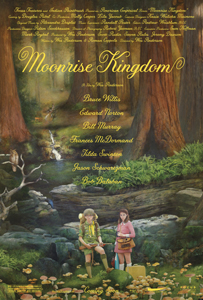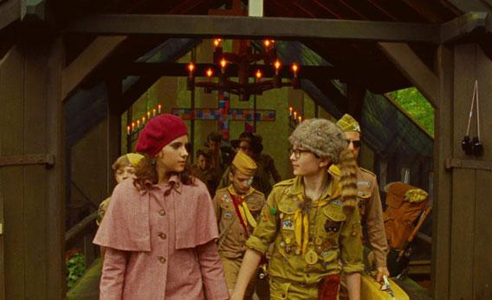
After working on the miniature sets and models for “Fantastic Mr. Fox,” director Wes Anderson realized that he could apply the same techniques to his live-action films. You could argue that he had already reached this goal with his previous works. You could also argue that his attention to detail trumps his ability to instill humanity into his films. Somewhere between those two goals lives “Moonrise Kingdom,” a wholly Adersonian art project with the unrestrained soul of the children the story is about.
Set on an island off the coast of New England in the summer of 1965, Moonrise Kingdom tells the story of two twelve-year-olds who fall in love, make a secret pact, and run away together into the wilderness. As various authorities try to hunt them down, a violent storm is brewing off-shore — and the peaceful island community is turned upside down in more ways than anyone can handle. Bruce Willis plays the local sheriff. Edward Norton is a Khaki Scout troop leader. Bill Murray and Frances McDormand portray the young girl’s parents. The cast also includes Tilda Swinton, Jason Schwartzman, and Jared Gilman and Kara Hayward as the boy and girl. (Synopsis by Focus Features)

This sweet love story is an ode to Anderson’s inner child. Like Peter Pan, the director has never really grown up and may be more in touch with his inner youth than ever before. The story exists within Anderson’s own Neverland, where the camera captures the world through a filter of youthful eyes. It’s a place where quitting the Khaki Scouts only requires a simple resignation letter, you can run away with your love to a secret hideaway with a record player, and even lightning strikes won’t really hurt you.
Sam, the Romeo of the tale, fills the role of sensitive yet brave and smart lead male. Orphaned and different from his foster family finds himself engrossed with his true love first met at the church play. Suzy, his love, hides behind a pair of binoculars to distance herself from the failing of her parent’s marriage. They find in each other someone who understands and accepts them. Isn’t that what first love really is?

Contrast that to the plight of the adults in this parable. All suffer from their own adult demons and wander through the film either depressed or extremely sad. Suzy’s parents’ marriage is falling apart and they don’t know how to reach their daughter. Ed Norton’s troop leader questions his leadership abilities. Bruce Willis’s sheriff is lonely and trying to maintain a relationship with Suzy’s mother. This constant contrast of the soft filter world of the children and the hard lined world of the adults lays the backdrop for the characters to grow.
Where this film separates from some other Anderson works is that character growth. The progression towards inner realization and conclusions is natural, as opposed Anderson’s to earlier works where the conclusions seem determined from the minute the curtain rises. The scenes at the young couples’ hideaway where they play as if they know what being in love is about are the best example of this growth in Anderson’s film making.
To truly enjoy this film it is essential that you recognize certain truths. One, this is a parable. It is not supposed to take place in the real world. It is symbolic of the ideal. Two, be wistful. Go back to your childhood and watch through that lens. There are some deeply poignant and moving parts of this story, if you let yourself be engrossed. Three, laugh. It’s not all seriousness. There are some truly funny lines written in. Like Max in “Where the Wild Things Are,” just let yourself howl.
“See It/ Rent It/ Skip It”: See it. Bring your own scarf.
FOUR STARS out of four.
Directed by Wes Anderson.
Rated PG-13 for sexual content and smoking.
Runtime: 1 hr. 33 min.



Leave a Reply
You must be logged in to post a comment.